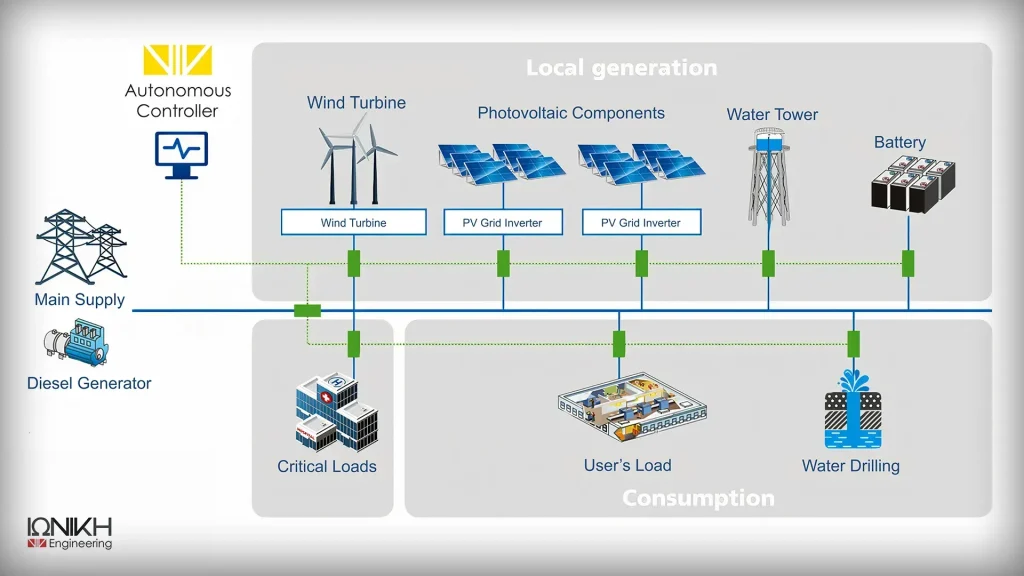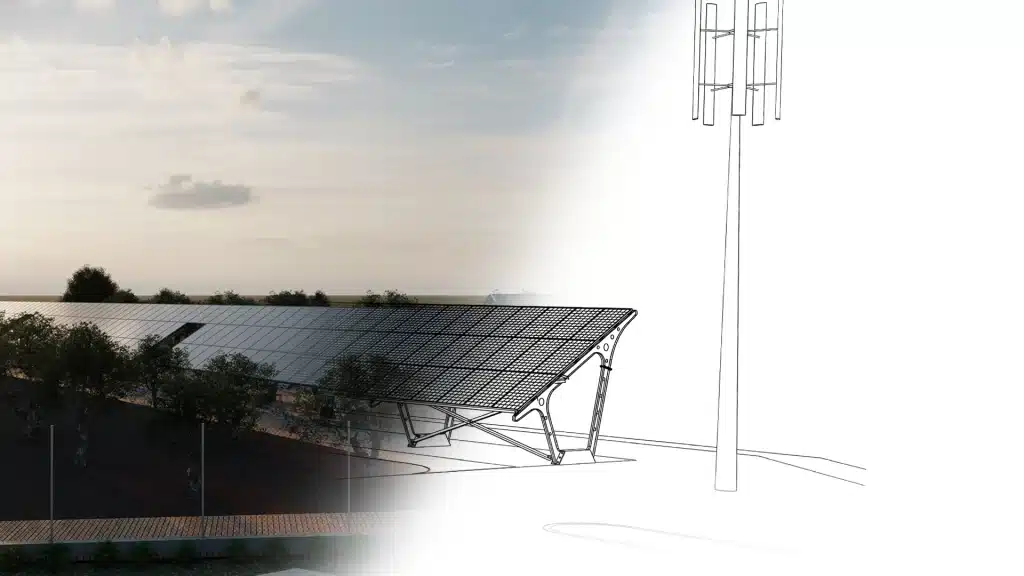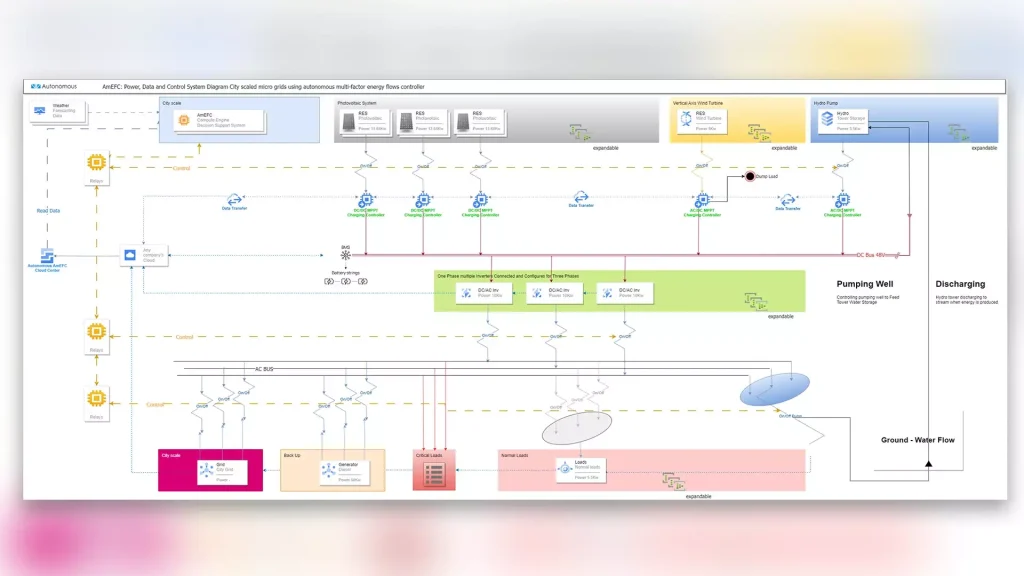In this article, you have the opportunity to read a case study of a professional photovoltaic system installed by ΙΩΝΙΚΗ Renewables, highlighting the benefits of this investment. The installation took place in a very small business, specifically in a machine shop.
Key Points of the Article:
– The state of the machine shop before the photovoltaic installation
– The needs of the business and the cost of the investment
– The financing of the business
– Licensing processes
– Installation and after-sales service
The installation of photovoltaic systems has become one of the most popular investments in recent years among professionals. This is largely due to the continuous increases in electricity costs, which have driven the operating and production costs of businesses to exorbitant heights. Consequently, maintaining competitive pricing becomes increasingly challenging.
As a result, more and more professionals have turned to green energy by installing photovoltaic systems on their business roofs in an effort to distinguish themselves from their competitors.
Case Study of Professional Photovoltaics: The Expansion of a Machine Shop and Rising Electricity Costs
Competition was the driving force for a machine shop in Xanthi to shift towards green energy. Although the machine shop was one of the most renowned in its sector throughout the Eastern Macedonia and Thrace region, the owner believed that building expansion and increased machinery were essential for maintaining the business’s top position in the industry and enhancing its profitability.
Upon completing the expansion and adding new equipment, the owner faced a particularly challenging problem: electricity costs had nearly doubled. As a result, he was confronted with the dilemma of whether to raise prices or reduce profitability.
Ultimately, he decided to trust ΙΩΝΙΚΗ Renewables, which presented him with a third option: photovoltaics.
Assessing Business Needs and Developing a Suitable Proposal
The first meeting between the entrepreneur and the engineers from ΙΩΝΙΚΗ Renewables took place at the machine shop. The owner showed all the spaces and discussed the electricity costs of the machinery. They also talked about another machine he wanted to add in the coming months. The electricity bills from his provider were indeed a significant burden, amounting to €400 monthly, which totaled €4,800 annually.
Based on the building’s layouts, orientation, and electricity bills, the engineers conducted the necessary study. They then presented the owner with the optimal solution for the system that would meet his needs.
The engineers’ study concluded that a photovoltaic system of 27.5 kW would suffice. Its installation would take place on the building’s roof, allowing the machine shop to be fully covered by the electricity produced by the photovoltaic system.
Case Study of Professional Photovoltaics: Cost, Financing, and Delegation of All Processes to ΙΩΝΙΚΗ
The entrepreneur received a detailed proposal containing two solutions: one cheaper and one more expensive, depending on the materials he chose for the installation. In both cases, the same type of panels was suggested. The difference stemmed from the manufacturer of the inverters.
If the owner opted for inverters of Chinese origin, the final cost would be €20,400. If he chose German-made inverters, the price would rise to €23,400. As a gift from ΙΩΝΙΚΗ Renewables, both options included an extension of the inverter warranty from 5 to 10 years.
Furthermore, the business owner was informed that he could take advantage of a program from the National Strategic Reference Framework (NSRF) that was available at that time. This program, called the "Toolbox," would allow him to recover 50% of the investment made. Notably, for the licensing study of the photovoltaic system and the submission of the file for the NSRF program, the owner was not burdened with any additional charges.
Thus, the choice of the more expensive option with the warranty for the German inverters became an easy decision for the entrepreneur. Thanks to the NSRF, he would recoup his investment in just 2.5 years.
Licensing Procedures and Submission of Files with Approvals in Less Than a Month
After signing the project contract between the machine shop and ΙΩΝΙΚΗ Renewables, the company's electrical engineers took over the study and completion of the licensing procedures for the photovoltaic system.
The file submitted to the HEDNO (Hellenic Electricity Distribution Network Operator) included plans for the photovoltaic system and the electrical schematic of the installation, known as the one-line diagram. Additionally, a multi-page technical report was submitted, detailing the installation process and specifying the materials to be used, complete with all Greek and European certifications. The file also contained the property ownership contract for the site where the installation would take place, along with all legal documents of the building. It included a statement from the engineer certifying the correctness of the documents, as well as the application for the licensing of the photovoltaic station.
The complete file was submitted to the relevant department of HEDNO in Xanthi. This authority is responsible for verifying the accuracy of all the submitted data. After approval, the request was forwarded to the regional branch of HEDNO in Thessaloniki. There, the availability of the grid and the capacity of the local substation to absorb an additional photovoltaic system for net metering were checked, and the installation permit was granted for contract signing.
The process from the start of the study to the signing of the contract took just over a month—an impressively short time considering the complexity of the study and the positive opinions from two particularly burdened public services.
Case Study of a Professional Photovoltaic System: Successful Installation Amid Lockdown
The next step, after finalizing the permit, was to order the bases, panels, and inverters. Despite the order being placed during particularly challenging conditions—global lockdown and a tremendous demand for new photovoltaic installations leading to shortages in the market—the materials were received a month after the order was finalized, and the installation began immediately.
Initially, the bases were installed with special care to ensure the roof's insulation. This was followed by the installation of the photovoltaic panels according to the plans submitted with the permit application.
Next, the installation of two inverters, each with a capacity of 15 kW, was completed, along with their electrical connection to the panels. Finally, the metering device was installed next to the existing meter, which enables the energy offsetting process.
The installation process, despite the difficult weather conditions in the Xanthi region at that time, was completed in 45 days.
The final stage, after the installation was completed, involved the process of receiving the system from the relevant HEDNO teams. After submitting the required documents and informing the service, the team checked the accuracy of the materials used and the installation, and then gave consent for the system to be electrified.
Now, the machine shop has become self-sufficient in energy for the operation of all its machinery, just over three months after entrusting the project to ΙΩΝΙΚΗ Renewables.
Support After Installation and Real-Time Monitoring of Photovoltaic Performance
However, support for the entrepreneur did not end with the connection of the system to the electrical grid, as there were still two open issues. First, the economists of ΙΩΝΙΚΗ Finance collected and submitted the necessary documentation to the "Toolbox" program platform to release the amount of €11,700, which is expected to be completed in the near future.
With the return of such a significant amount, the business can proceed with future increases in mechanical equipment, which were the owner’s goals.
Moreover, the activation of the remote monitoring system allows both the owner and the engineers at ΙΩΝΙΚΗ Renewables to check the photovoltaic system's performance in real time on a daily basis.
This way, any faults leading to low system performance can be quickly identified. If the fault is due to a material covered by warranty, it can be replaced promptly. Alternatively, if the warranty has expired, the owner will be informed of the fault.
Avoiding Additional Burdens from Rising Electricity Costs
The project was completed shortly before the anticipated rapid increases in electricity costs, a fortunate timing for the owner of the machine shop, who would have undoubtedly struggled to cope with the market conditions expected to develop in the near future.
Shifting to green energy and installing such a large system can be a particularly challenging decision for any entrepreneur. However, when they choose to collaborate with the right companies in the renewable energy sector, which understand the processes and keep them informed at every step, it can become a relatively easy choice.
Photovoltaics by ΙΩΝΙΚΗ Renewables: By your side every step of the way
At ΙΩΝΙΚΗ Renewables, as shown in this case study of a professional photovoltaic project, we have experience in the study and installation of photovoltaics. We have installed photovoltaic parks, as well as photovoltaics for homes and businesses across Greece, including on islands. We handle all the processes from potential financing, study, submission of the file, installation, and we deliver your photovoltaic system turn-key.
Are you interested in solar in your business? Click on the button “I Want a phone appointment” below, fill out the form and a competent engineer will contact with you to solve all your questions and to guide you to the right decision.
Case Study: Installation of Photovoltaic Systems in a Very Small Business
George Kotakis
Electrical Engineer |
ΙΩΝΙΚΗ Autonomous
In this article, you have the opportunity to read a case study of a professional photovoltaic system installed by ΙΩΝΙΚΗ Renewables, highlighting the benefits of this investment. The installation took place in a very small business, specifically in a machine shop.
Key Points of the Article:
– The state of the machine shop before the photovoltaic installation
– The needs of the business and the cost of the investment
– The financing of the business
– Licensing processes
– Installation and after-sales service
The installation of photovoltaic systems has become one of the most popular investments in recent years among professionals. This is largely due to the continuous increases in electricity costs, which have driven the operating and production costs of businesses to exorbitant heights. Consequently, maintaining competitive pricing becomes increasingly challenging.
As a result, more and more professionals have turned to green energy by installing photovoltaic systems on their business roofs in an effort to distinguish themselves from their competitors.
Case Study of Professional Photovoltaics: The Expansion of a Machine Shop and Rising Electricity Costs
Competition was the driving force for a machine shop in Xanthi to shift towards green energy. Although the machine shop was one of the most renowned in its sector throughout the Eastern Macedonia and Thrace region, the owner believed that building expansion and increased machinery were essential for maintaining the business’s top position in the industry and enhancing its profitability.
Upon completing the expansion and adding new equipment, the owner faced a particularly challenging problem: electricity costs had nearly doubled. As a result, he was confronted with the dilemma of whether to raise prices or reduce profitability.
Ultimately, he decided to trust ΙΩΝΙΚΗ Renewables, which presented him with a third option: photovoltaics.

Assessing Business Needs and Developing a Suitable Proposal
The first meeting between the entrepreneur and the engineers from ΙΩΝΙΚΗ Renewables took place at the machine shop. The owner showed all the spaces and discussed the electricity costs of the machinery. They also talked about another machine he wanted to add in the coming months. The electricity bills from his provider were indeed a significant burden, amounting to €400 monthly, which totaled €4,800 annually.
Based on the building’s layouts, orientation, and electricity bills, the engineers conducted the necessary study. They then presented the owner with the optimal solution for the system that would meet his needs.
The engineers’ study concluded that a photovoltaic system of 27.5 kW would suffice. Its installation would take place on the building’s roof, allowing the machine shop to be fully covered by the electricity produced by the photovoltaic system.

Case Study of Professional Photovoltaics: Cost, Financing, and Delegation of All Processes to ΙΩΝΙΚΗ
The entrepreneur received a detailed proposal containing two solutions: one cheaper and one more expensive, depending on the materials he chose for the installation. In both cases, the same type of panels was suggested. The difference stemmed from the manufacturer of the inverters.
If the owner opted for inverters of Chinese origin, the final cost would be €20,400. If he chose German-made inverters, the price would rise to €23,400. As a gift from ΙΩΝΙΚΗ Renewables, both options included an extension of the inverter warranty from 5 to 10 years.
Furthermore, the business owner was informed that he could take advantage of a program from the National Strategic Reference Framework (NSRF) that was available at that time. This program, called the "Toolbox," would allow him to recover 50% of the investment made. Notably, for the licensing study of the photovoltaic system and the submission of the file for the NSRF program, the owner was not burdened with any additional charges.
Thus, the choice of the more expensive option with the warranty for the German inverters became an easy decision for the entrepreneur. Thanks to the NSRF, he would recoup his investment in just 2.5 years.
Licensing Procedures and Submission of Files with Approvals in Less Than a Month
After signing the project contract between the machine shop and ΙΩΝΙΚΗ Renewables, the company's electrical engineers took over the study and completion of the licensing procedures for the photovoltaic system.
The file submitted to the HEDNO (Hellenic Electricity Distribution Network Operator) included plans for the photovoltaic system and the electrical schematic of the installation, known as the one-line diagram. Additionally, a multi-page technical report was submitted, detailing the installation process and specifying the materials to be used, complete with all Greek and European certifications. The file also contained the property ownership contract for the site where the installation would take place, along with all legal documents of the building. It included a statement from the engineer certifying the correctness of the documents, as well as the application for the licensing of the photovoltaic station.
The complete file was submitted to the relevant department of HEDNO in Xanthi. This authority is responsible for verifying the accuracy of all the submitted data. After approval, the request was forwarded to the regional branch of HEDNO in Thessaloniki. There, the availability of the grid and the capacity of the local substation to absorb an additional photovoltaic system for net metering were checked, and the installation permit was granted for contract signing.
The process from the start of the study to the signing of the contract took just over a month—an impressively short time considering the complexity of the study and the positive opinions from two particularly burdened public services.

Case Study of a Professional Photovoltaic System: Successful Installation Amid Lockdown
The next step, after finalizing the permit, was to order the bases, panels, and inverters. Despite the order being placed during particularly challenging conditions—global lockdown and a tremendous demand for new photovoltaic installations leading to shortages in the market—the materials were received a month after the order was finalized, and the installation began immediately.
Initially, the bases were installed with special care to ensure the roof's insulation. This was followed by the installation of the photovoltaic panels according to the plans submitted with the permit application.
Next, the installation of two inverters, each with a capacity of 15 kW, was completed, along with their electrical connection to the panels. Finally, the metering device was installed next to the existing meter, which enables the energy offsetting process.
The installation process, despite the difficult weather conditions in the Xanthi region at that time, was completed in 45 days.
The final stage, after the installation was completed, involved the process of receiving the system from the relevant HEDNO teams. After submitting the required documents and informing the service, the team checked the accuracy of the materials used and the installation, and then gave consent for the system to be electrified.
Now, the machine shop has become self-sufficient in energy for the operation of all its machinery, just over three months after entrusting the project to ΙΩΝΙΚΗ Renewables.
Support After Installation and Real-Time Monitoring of Photovoltaic Performance
However, support for the entrepreneur did not end with the connection of the system to the electrical grid, as there were still two open issues. First, the economists of ΙΩΝΙΚΗ Finance collected and submitted the necessary documentation to the "Toolbox" program platform to release the amount of €11,700, which is expected to be completed in the near future.
With the return of such a significant amount, the business can proceed with future increases in mechanical equipment, which were the owner’s goals.
Moreover, the activation of the remote monitoring system allows both the owner and the engineers at ΙΩΝΙΚΗ Renewables to check the photovoltaic system's performance in real time on a daily basis.
This way, any faults leading to low system performance can be quickly identified. If the fault is due to a material covered by warranty, it can be replaced promptly. Alternatively, if the warranty has expired, the owner will be informed of the fault.
Avoiding Additional Burdens from Rising Electricity Costs
The project was completed shortly before the anticipated rapid increases in electricity costs, a fortunate timing for the owner of the machine shop, who would have undoubtedly struggled to cope with the market conditions expected to develop in the near future.
Shifting to green energy and installing such a large system can be a particularly challenging decision for any entrepreneur. However, when they choose to collaborate with the right companies in the renewable energy sector, which understand the processes and keep them informed at every step, it can become a relatively easy choice.
Photovoltaics by ΙΩΝΙΚΗ Renewables: By your side every step of the way
At ΙΩΝΙΚΗ Renewables, as shown in this case study of a professional photovoltaic project, we have experience in the study and installation of photovoltaics. We have installed photovoltaic parks, as well as photovoltaics for homes and businesses across Greece, including on islands. We handle all the processes from potential financing, study, submission of the file, installation, and we deliver your photovoltaic system turn-key.
Are you interested in solar in your business? Click on the button “I Want a phone appointment” below, fill out the form and a competent engineer will contact with you to solve all your questions and to guide you to the right decision.












